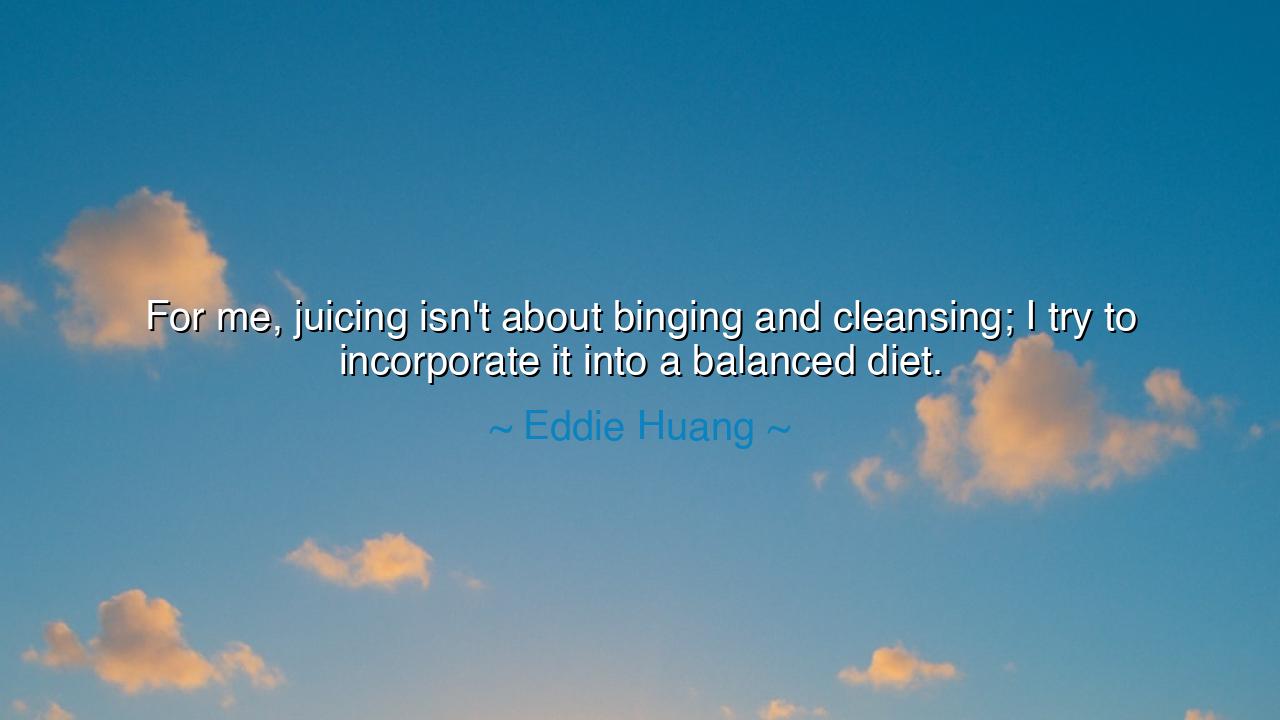
For me, juicing isn't about binging and cleansing; I try to
For me, juicing isn't about binging and cleansing; I try to incorporate it into a balanced diet.






"For me, juicing isn't about binging and cleansing; I try to incorporate it into a balanced diet." – Eddie Huang
In these words, Eddie Huang reveals not only a philosophy of food, but a way of living that is deeply rooted in the ancient pursuit of balance. He speaks against the illusion of extremes—the cycle of indulgence and repentance, of binging and cleansing—that has ensnared the modern soul. His insight is not simply about juicing or diet; it is about the discipline of moderation, the art of integrating rather than oscillating between chaos and restraint. Huang reminds us that the key to wellness, as in all things, lies not in fleeting purges or passionate overcorrections, but in continuity, harmony, and the calm rhythm of sustained balance.
The ancients understood this wisdom well. The philosopher Aristotle taught that virtue was found in the golden mean, the sacred point between excess and deficiency. The same teaching appears in the wisdom of the East, where the Buddha, after years of starvation and indulgence alike, discovered enlightenment through the Middle Way—neither denial nor indulgence, but a steady harmony between them. Eddie Huang’s reflection is a modern echo of these truths. He reminds us that the body, like the spirit, thrives on consistency, not extremity. To drink juice not as penance nor as indulgence, but as part of a balanced diet, is to honor the body’s natural rhythm—the same rhythm that governs the tides, the seasons, and the turning of the earth itself.
In a world that celebrates extremes—fasts that promise purity, feasts that promise joy—Huang’s voice is one of temperance. He recognizes that health, like wisdom, cannot be bought in a bottle or found in a frenzy of reform. The obsession with “cleansing” reflects an ancient pattern of human guilt—the belief that one can undo indulgence through sudden sacrifice. Yet such cycles bring only exhaustion, not renewal. Huang’s wisdom lies in rejecting this false rhythm. He does not reject juicing, but redefines it—not as a punishment for excess, but as a practice of nourishment. This is the essence of balance: not the abandonment of pleasure, but the transformation of it into harmony.
Consider the story of Cato the Younger, the Roman statesman known for his moderation amidst luxury. While his peers drowned themselves in banquets and revelry, Cato maintained a steady diet, simple yet sufficient. He neither starved nor gorged himself; he lived by reason, not impulse. His strength was not merely physical but moral—an unbroken steadiness that made him incorruptible in a corrupt age. Like Cato, Huang teaches that true mastery of the self is found not in denial, but in control without extremity. The one who drinks juice to balance his diet, not to purge his guilt, lives in mastery.
In Huang’s words, we also hear the whisper of self-knowledge. He understands his own nature and rejects the illusion of quick fixes. This self-awareness is the foundation of all ancient wisdom. The Delphic oracle’s inscription—“Know thyself”—guided philosophers and seekers alike. To know oneself is to understand the limits and needs of one’s own being. Huang’s approach to food mirrors this principle: he knows that his strength lies not in denial, but in mindful inclusion. To incorporate juicing is to weave it naturally into the fabric of life, without rupture or rebellion. It is the difference between the man who fights his nature and the one who works with it.
His quote is also a quiet rebellion against the spirit of modern excess disguised as virtue. The modern world praises the one who “cleanses” as if purification can be achieved through brief discomfort, forgetting that true purity comes from daily mindfulness. The ancients would laugh at our feverish cycles of indulgence and repentance, for they knew that peace is born of stability, not spectacle. In this sense, Huang stands as a modern philosopher of the kitchen—a teacher reminding us that wisdom can be found even in the glass of juice, if one drinks with awareness and balance.
The lesson, then, is this: reject extremes. Do not live by the violence of opposites, but by the harmony of the whole. Whether in food, in work, or in spirit, seek not the fleeting thrill of change, but the enduring power of moderation. Let every act of nourishment be done in gratitude, not guilt. Add to your life what strengthens it; remove what weakens it—but do so with patience, not punishment. To “incorporate” is to live in alignment, to make every choice part of the greater pattern of balance that sustains all living things.
So let Eddie Huang’s words be remembered not merely as advice on diet, but as a parable of living. The wise do not cleanse what they have stained, nor starve what they have overfed—they build a life so steady that such cleansing is never needed. Drink not to purge, but to sustain; eat not to escape, but to grow. For the body, like the spirit, flourishes not through extremes, but through the quiet, balanced rhythm of harmony with the self and with nature.






AAdministratorAdministrator
Welcome, honored guests. Please leave a comment, we will respond soon